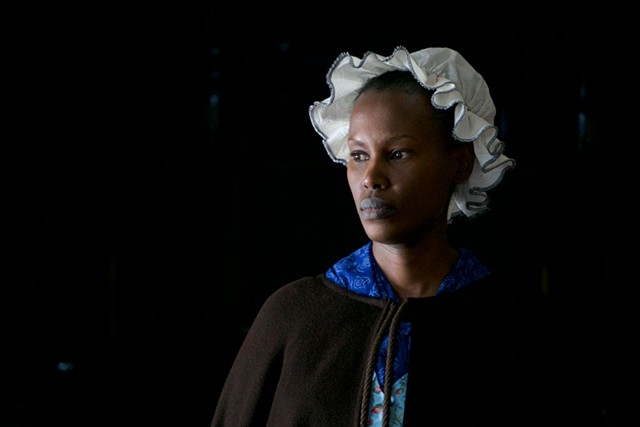
- Courtesy
- Lucy Terry Prince (Eva Ndachi) in Jay Craven's new film, Lost Nation
It all started with a broken arm. When filmmaker Jay Craven first moved to Vermont, in spring 1974, the only way he could heat his farmhouse was with wood. He borrowed a truck to lug the logs back to his house, but one drive downhill and a pair of failed brakes later, he had a cast on his right arm. Unable to finish editing a documentary, he had time to explore the Vermont History Museum in Montpelier, where he learned about the story of Ethan Allen. Fifty years later, he's reimagined the Vermont Revolutionary War hero's legend.
The 10th film from the prolific Vermont director, Lost Nation tells two intersecting, fictionalized tales of historical figures: Allen, one of the state's founding fathers; and African American poet Lucy Terry Prince, who was living in Vermont at the same time as Allen. It premieres at the Latchis Theatre in Brattleboro on Wednesday and Thursday, July 10 and 11, and screens at Main Street Landing Performing Arts Center in Burlington on Friday and Saturday, July 12 and 13, before embarking on a series of showings throughout Vermont and Massachusetts.
A farmer, writer, soldier and politician, Allen was a significant player in Vermont's fight for independence and resistance to New York's control. In Lost Nation, he's played by the steely-eyed Irish actor Kevin J. Ryan. The film portrays the leader of the Green Mountain Boys militia as a man on a mission, determined to do whatever's necessary to win Vermont's sovereignty.
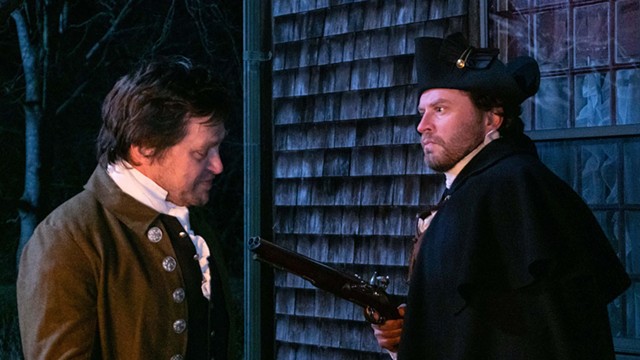
- Courtesy
- From left: John Noyes (Rob Campbell) and Ethan Allen (Kevin J. Ryan) in Lost Nation
Prince's history is less known. Her poem "Bars Fight," a 1746 ballad about an assault on two white families by Native Americans, is considered the oldest known piece of literature by an African American. Eva Ndachi's performance as Prince is muted in contrast to Ryan's, yet her command of the character is powerful.
The rebel schemer and the poet-activist came from different backgrounds and fought for independence in opposite ways — Allen through often covert military exploits and Prince by appealing to Vermont governor Thomas Chittenden to protect her family against racial persecution. To Craven, the two figures are connected through the shared experience of protecting their land.
There's no recorded history of Prince and Allen meeting, but in Lost Nation, their paths cross when Prince sees Allen rounding up a group of American traitors. Aside from that chance encounter, the film alternates between their stories.
"Working with two separate characters in a parallel through line is a challenge — something I tell my students never to do," Craven, 73, said. "But the film is principally driven by known history."
Always on a tight budget, Craven has long incorporated teaching into his director role. He works with students through the program Semester Cinema, which he refined over 23 years at various institutions (it's currently at Vermont State University), while also bringing in bigger-name stars and seasoned Vermont actors.
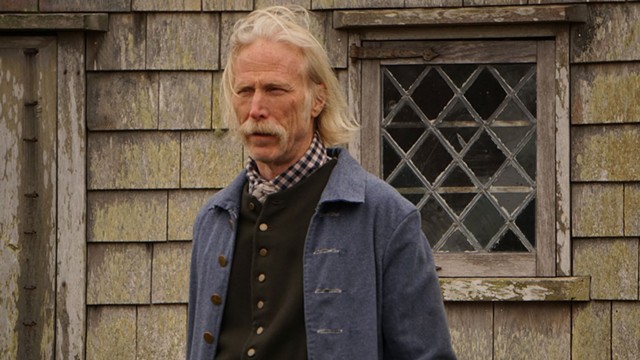
- Courtesy
- Asa Locke (Rusty Dewees) In lost Nation
Rusty DeWees, a local legend for his comedy routine "The Logger," plays the fictional Asa Locke in the film. A longtime collaborator of Craven's, he had one of his first roles in the director's 1993 debut, Where the Rivers Flow North.
"There was such an evenness to this crew," DeWees said of Lost Nation. "Everyone was on the same page, the same level, and it was just a fun time."
It wasn't just the friendship between DeWees and Craven that made the shoot flow smoothly. Both men sang the praises of the students on the crew.
"There's an eagerness to learn and an excitement about the process of making a film that is totally new and unfamiliar to them," Craven said.
Audiences can learn from the movie, too. Andrew Liptak, PR and guest services coordinator for the Vermont Historical Society, sees films such as Lost Nation as an entry point to education.
"When people consume entertainment, whether it's a western or a historical film, they get their first impression of what that world is like," Liptak said. "[Films] subtly inform the public's knowledge of historical events."
"The past speaks to us," Craven said. He compared Allen's desire to be seen as a great man to the aspirations of modern politicians. "Despite the fact that this film takes place 250 years ago, there's a lot of modern characterization at play."
In the movie, Allen's rapacious nature often seems to go against the interests of his fellow soldiers. He wants to reclaim land, regardless of the expense. While Allen is lionized in Vermont history, Craven, along with many historians, suggests that he was a more complex — read: controversial — figure in real life.
Craven has always kept his work close to home. Two of his features, Where the Rivers Flow North and Disappearances (2006), were made within three miles of his house in Peacham.
Much of Lost Nation was shot on Nantucket, Mass., but Marlboro, Vt., was also a core location of significance. The Prince family homestead is there, and Craven taught film at the now-defunct Marlboro College for more than 20 years.
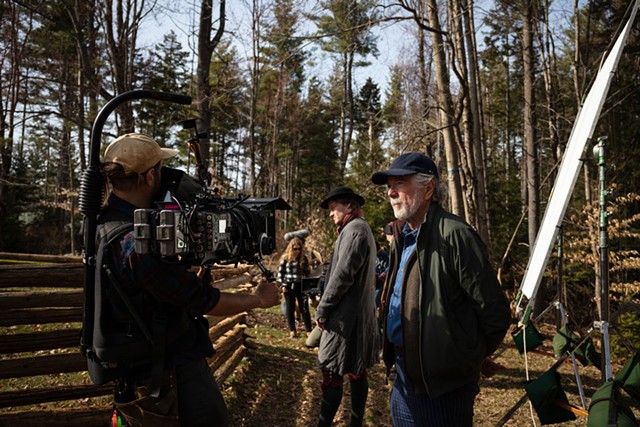
- File: Zachary P. Stephens
- Jay Craven On The Set Of lost Nation In 2022
In a 2022 interview with Seven Days, Craven suggested that Lost Nation might be his last film, but that prediction turned out to be premature. He has since lined up a new feature — Major Barbara, a modern adaptation of George Bernard Shaw's satirical 1905 comedy.
Lost Nation does appear to complete a multi-decade odyssey of Vermont-based storytelling, however, in which Craven has honored and challenged local lore. By focusing on themes of bravery and determination without ignoring the uglier traits of bygone eras, he has sparked conversations that offer new angles on the past.
"History is not this one-sided story," Liptak said. "It's a complicated tapestry, and ... understanding the complexity ... and having these conversations gives us a better picture of what the past was like and how we've gotten here today."
Craven is curious to hear the conversations around Lost Nation and hopes more filmmakers will be inspired to present their visions of Vermont's history.
"We know ourselves better if we can engage and articulate," he said. "And so what I simply ask of anyone with my work is to consider it and, if it resonates, to carry it forward."

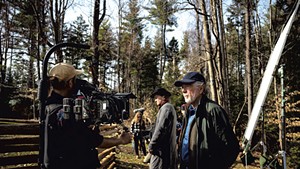

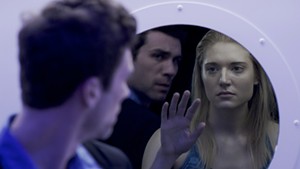
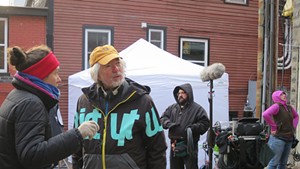





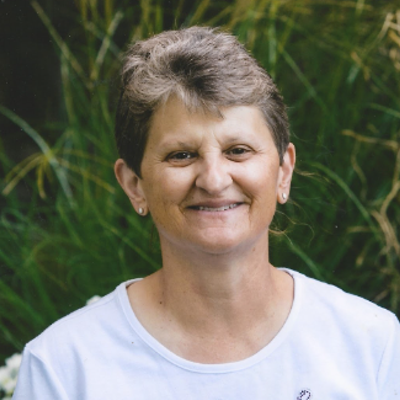
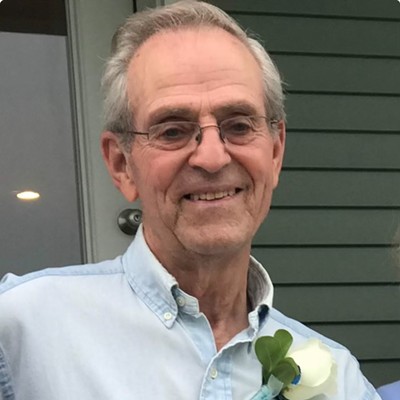

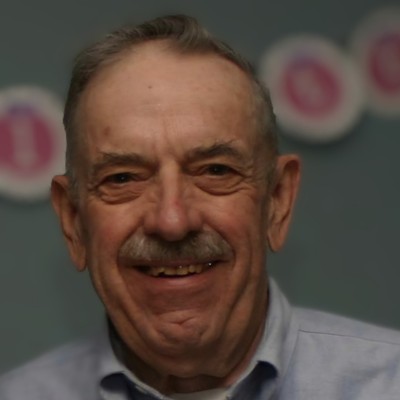
Comments
Comments are closed.
From 2014-2020, Seven Days allowed readers to comment on all stories posted on our website. While we've appreciated the suggestions and insights, right now Seven Days is prioritizing our core mission — producing high-quality, responsible local journalism — over moderating online debates between readers.
To criticize, correct or praise our reporting, please send us a letter to the editor or send us a tip. We’ll check it out and report the results.
Online comments may return when we have better tech tools for managing them. Thanks for reading.